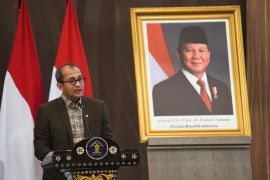"Our estimate puts the growth rate at around 5.1-5.2 percent or more or less the same as in 2018," Executive Director of CORE Indonesia Mohammad Faisal said at a discussion on CORE Economic Outlook 2019 here on Wednesday.
Faisal said the government`s target of 5.3 percent set for 2019, was too optimistic and would be difficult to come to reality.
The government could increase its spending to boost economic growth but two other main drivers - investment and exports - remain in the doldrums and still under pressure.
"Household consumption, which has been the biggest contributor to the Gross Domestic Product (GDP) so far, would most likely not grow more than 5.1 percent," Faisal said.
CORE itself predicted that the household consumption would grow only 5 percent in 2019.
Among the series of government policies aimed at jacking up income and strengthening the people`s purchasing power, and expected to be able to maintain the level of household consumption, include the plan to raise the salaries of civil servants, and premium of social security for civil servants, the military and police, increase in social aid for the poor and rise in minimum wage.
The legislative and presidential elections which are to take place at once in April 2019 are also expected to jack up consumption by the private sector. The allocation budget for social aid in 2019 rose sharply by 26.7 percent after soaring 42.6 percent in 2018.
"Although separately, the effect of the policies on household consumption would not be too big , but combined the effect would be significant on household consumption in 2019," Faisal said.
He went on to say although the economic challenged to be faced would be heavier, it does not mean that there is no opportunity to accelerate the economic growth at a higher rate in 2019.
CORE said in order to boost economic growth amid global pressure, the government needs to find the root of the problem hampering the economic development in the country .
The government should be more innovative to locate the hurdles and find a solution, it added.
"Not merely instant approaches to decorate its economic performance in the political year ahead of the presidential elections. At least the government needs to watch that the policies would not result in shrinking purchasing power of the people and household consumption, the main driver of economic growth," Faisal said.
Maintaining the oil fuel prices on the domestic market is crucial to prevent an increase in inflation and shrinking purchasing power of middle and low income people. In addition, Bank Indonesia needs to work hard maintain stability in rupiah value to keep consumers optimism and business players in the country, he said.
Reporting by Citro Atmoko, Albert Saragih
Editing by Yoseph Haryadi
Reporter: Antara
Editor: Suharto
Copyright © ANTARA 2018











